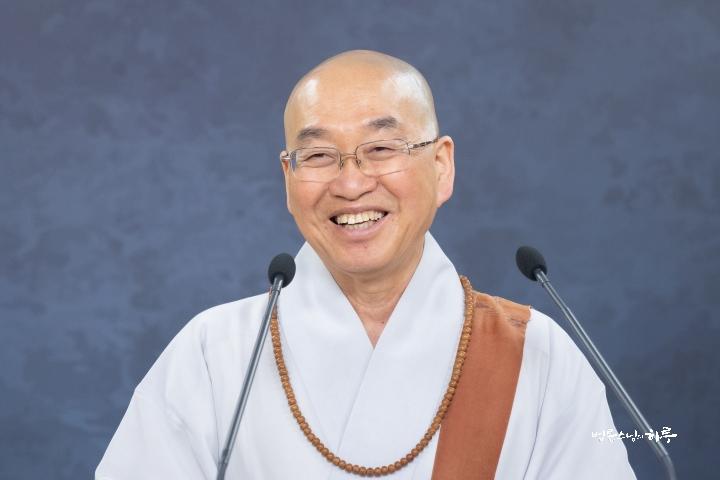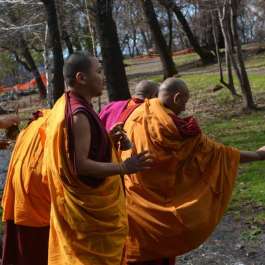
The Korean Seon (Zen) master Venerable Pomnyun Sunim (법륜스님) wears many hats: Buddhist monk, teacher, author, environmentalist, social activist, and podcaster, to name a few. As a widely respected Dharma teacher and a tireless socially engaged activist in his native South Korea, Ven. Pomnyun Sunim has founded numerous Dharma-based organizations, initiatives, and projects that are active across the world. Among them, Jungto Society, a volunteer-based community founded on the Buddhist teachings and expressing equality, simple living, and sustainability, is dedicated to addressing modern social issues that lead to suffering, including environmental degradation, poverty, and conflict.
The following article shared by Jungto Society is part of a series of notable highlights from Ven. Pomnyun Sunim’s writings, teachings, and regular live-streamed Dharma Q+A sessions, which are accessible across the globe.

Q. Lately, whenever we hear about what will happen in the future, it is often bad news. For example, we hear about global warming, rising sea levels, a growing income gap between the rich and the poor, war, starvation, and diseases.
I feel that any news we hear about future trends is always negative, so I cannot help but feel pessimistic in my outlook about the future. This is not stopping me from trying to live a happy life, but I cannot help feeling bad for future generations. I am not talking about only the next generation, but those down the line as well. I feel like we are leaving them a world that is no better than the one that we inherited. So, my question for you is how do you keep a positive outlook toward the future?
VPS: Yes, what you say is true. There are a lot of negative predictions about the future. So is this a singular phenomenon that is happening only in the present? I am sure it was the same way in the past. The people of the current generation always worry about the future of their children. When those children grow up, they will be pessimistic about the future and worry about the future of their own children. This has always been true throughout history, from generation to generation, but humankind has continued to survive.
The history of human civilization is about 10,000 years old. Throughout history, various civilizations held power at different points of time. Thousands of years ago, the Egyptian civilization, the Aegean civilization, the Greek civilization, and the Roman civilization all rose and fell. It is the same with our modern civilization. It will eventually fall.
This is why you see a lot of negativity about the future. The biggest problems we see are environmental issues. As you mentioned, there are a lot of problems, such as nuclear arms, diseases, viruses, and food shortages. Any civilization will ultimately fall, but then we also see the start of a new civilization. Therefore, when human beings become extinct, a new species will arise.
If you look back in history, even among human beings there have been many different types of humans over the millennia. We are Homo sapiens. Homo sapiens are only about 150,000 years old. We have been the main drivers of civilization for about 40,000 years. If you look at it from the Earth’s point of view, it’s a very short time. So you should not look at the world with a short-term view.
However, if you want this world, this civilization in which we live, to last a little longer, we do have to change our lifestyles—the way we live. First, we need to re-examine our concept of a “good” life as defined by mass production and consumption. Unless we overcome this consumption-driven paradigm, we will soon run out of resources. Then there will be competition for those diminishing resources, and nations will end up going to war. Also, if we keep consuming at this rate, the resulting trash and wste will cause more environmental problems and change the climate. That’s why we need to overcome this consumption-driven paradigm.
A “good” life is defined by increased consumption in advanced economies, and people in less-developed countries will follow this lead. Currently, there are about 1.2 billion people whose per-capita GDP US$20,000 or more. Note that our environment is already in dire straits even with this relatively small number of people with high consumption. About 5.8 billion of the world’s population are below this level of income and consumption, and are following behind.
China is coming in fast on our heels: that accounts for 1.4 billion people. China has a larger population than all of the OECD countries combined. Then, you have India; that’s 1.2 billion people. India is following fast on our heels as well. You don’t have to be an expert to see this. If we go on the way we are going now, the Earth’s environment cannot be sustained.
We can already see the end of the current civilization, but we can’t stop this. We are all worried about where this train is heading, but we don’t change the way we live. So we have a choice: we can keep on living as we do now and destroy ourselves in the process, or we can change direction. It’s not somebody else’s problem; it’s our problem.
Instead of being pessimistic, we need to start changing the values that drive our lives. We must be fully confident in believing that simply earning more and spending more is not a good life. For example, smokers look for better cigarettes. Drinkers look for better spirits. But no matter how good the quality of the cigarette you smoke or the spirit you drink, it’s better not to smoke or drink at all. You have to firmly believe that, so no matter how much Mr. Jones or Mrs. Smith consume, if it’s not a good thing, you shouldn’t follow suit.
The first question to ask yourself is: can you exercise such self-discipline? Try it for yourself. If you are able to do so, your neighbour might be able to do so as well. Then you can start expanding this movement. You have to take action because just worrying doesn’t change anything. Instead of wasting your time worrying, use that time to make the effort to change the way you live, and then share your positive experiences with others.
Then, perhaps, you may be able to help transform this civilization a little bit and extend its life, albeit by a little. All we can do is try our best. That’s life.
See more
Pomnyun
Jungto Society
JTS Korea
JTS America
International Network of Engaged Buddhists
Related videos from BDG
Dharma Q+A with Ven. Pomnyun Sunim
Wisdom Notes from Ven. Pomnyun Sunim
Related features from BDG
Ven. Pomnyun Sunim: Buddhism in a Divided World
The Hungry Should Eat: JTS Brings Buddhist Compassion and Relief to India
Engaged Buddhism: Seon Master Pomnyun Sunim Pledges 10,000 Tons of Food Aid for Children in North Korea
Engaging with Suffering, Realizing Freedom: An Interview with Ven. Pomnyun Sunim
Related news reports from BDG
Engaged Buddhism: Ven. Pomnyun Sunim and JTS Volunteers Visit Sujata Academy Project in India
Engaged Buddhism: Ven. Pomnyun Sunim and JTS Volunteers Bring 100,000 Gas Stoves to Rohingya Refugees in Bangladesh
Engaged Buddhism: Ven. Pomnyun Sunim Shares the Fruits of Compassion to Mark the Birth of the Buddha
Engaged Buddhism: Ven. Pomnyun Sunim Delivers Compassion to the Vulnerable in Korea
Engaged Buddhism: Jungto Society Delivers Compassion for the Vulnerable in Korea
Engaged Buddhism: JTS Korea Distributes Emergency Flood Relief in Cambodia
Engaged Buddhism: JTS Korea Donates COVID-19 Relief Supplies to Myanmar in Cooperation with INEB and KMF
Engaged Buddhism: Jungto Society Sharing the Gift of Compassion this Winter
UPDATE: Buddhist Relief from JTS Korea Transforming the Lives of Rohingya Refugees
Engaged Buddhism: JTS Korea Brings Warmth to Vulnerable Communities amid Winter Freeze












